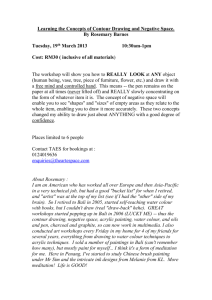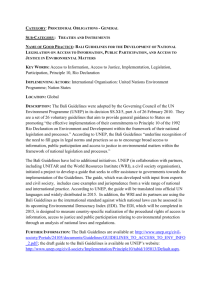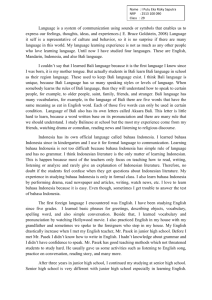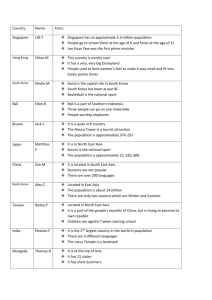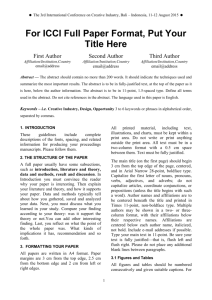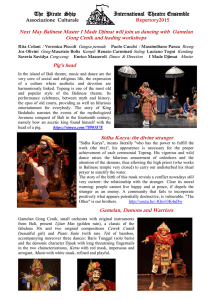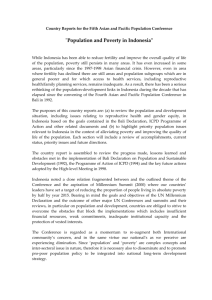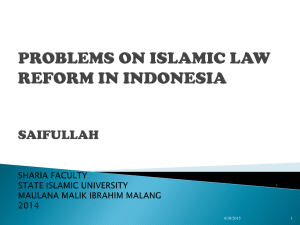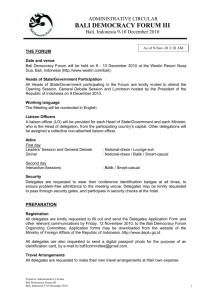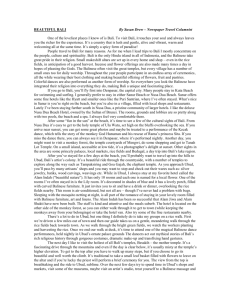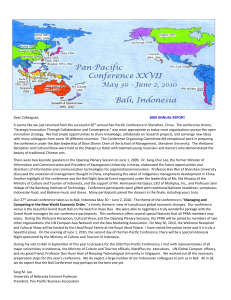Bali Bomb mystery Saturday 12th October
advertisement
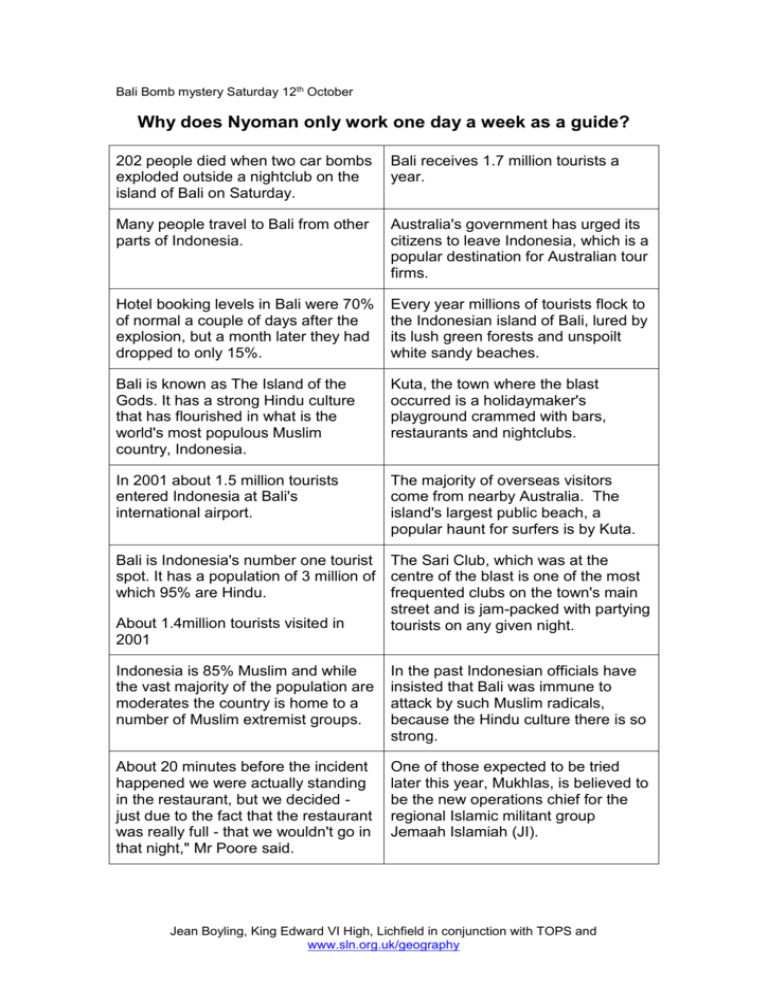
Bali Bomb mystery Saturday 12th October Why does Nyoman only work one day a week as a guide? 202 people died when two car bombs exploded outside a nightclub on the island of Bali on Saturday. Bali receives 1.7 million tourists a year. Many people travel to Bali from other parts of Indonesia. Australia's government has urged its citizens to leave Indonesia, which is a popular destination for Australian tour firms. Hotel booking levels in Bali were 70% of normal a couple of days after the explosion, but a month later they had dropped to only 15%. Every year millions of tourists flock to the Indonesian island of Bali, lured by its lush green forests and unspoilt white sandy beaches. Bali is known as The Island of the Gods. It has a strong Hindu culture that has flourished in what is the world's most populous Muslim country, Indonesia. Kuta, the town where the blast occurred is a holidaymaker's playground crammed with bars, restaurants and nightclubs. In 2001 about 1.5 million tourists entered Indonesia at Bali's international airport. The majority of overseas visitors come from nearby Australia. The island's largest public beach, a popular haunt for surfers is by Kuta. Bali is Indonesia's number one tourist The Sari Club, which was at the spot. It has a population of 3 million of centre of the blast is one of the most which 95% are Hindu. frequented clubs on the town's main street and is jam-packed with partying About 1.4million tourists visited in tourists on any given night. 2001 Indonesia is 85% Muslim and while the vast majority of the population are moderates the country is home to a number of Muslim extremist groups. In the past Indonesian officials have insisted that Bali was immune to attack by such Muslim radicals, because the Hindu culture there is so strong. About 20 minutes before the incident happened we were actually standing in the restaurant, but we decided just due to the fact that the restaurant was really full - that we wouldn't go in that night," Mr Poore said. One of those expected to be tried later this year, Mukhlas, is believed to be the new operations chief for the regional Islamic militant group Jemaah Islamiah (JI). Jean Boyling, King Edward VI High, Lichfield in conjunction with TOPS and www.sln.org.uk/geography Islamic militant group Jemaah Islamiah is thought to want to overthrow governments in the region and replace them with a pan-South East Asian Islamic state. Many of the people being linked to the Bali bombings got to know each other at an Islamic school in Malaysia. Many radical Muslims fled here in the early 1990s to dodge the suppression of the former Indonesian dictator Suharto. One result of the plot's failure was that Singapore and Malaysia clamped down on dozens of Islamic militants, holding them without trial under punitive security laws. Islamic militant groups decided to turn to soft targets, as embassies were becoming better protected. The two bombs killed mostly foreign tourists. Australia suffered the greatest number of casualties, with 88 Australian nationals losing their lives. Thirty-eight Indonesians, 23 Britons, nine Swedes, seven Americans, six Germans and four Dutch nationals also lost their lives. FPI supporters are concerned with local issues, acting within their communities against what they see as being against Islamic law. Under recently passed anti-terror regulations, Imam Samudra faces the death penalty if found guilty. Imam Samudra is one of three suspects accused of being part of Jemaah Islamiah, a pan-Asian network of Muslim extremists which some governments have accused of plotting the attacks. Many members of the Islamic Defenders' Front (FPI) are young and believe that Muslims in Jakarta, and all over Indonesia, have erred from Islamic teachings. He says the bombers would have arrived alongside hundreds of thousands of Indonesians in search of work, legally and illegally, and the human traffic was such that it would have been impossible to track them. Tourism is the backbone of the island's economy. Unlike other groups the FPI is not fighting for an Islamic state, but it does want to establish strict Sharia law. Muslim groups say their mission is to forge a spiritual form of jihad through preaching, not fighting. It runs a school and hospital. Although it has been accused of raiding nightclubs, analysts do not think the FPI was involved in the Bali attack. Nor have they used explosives before. As we drove along the small street leading to the Sari nightclub, more and more of the shops had lost their windows, blown out by the force of the blast Shattered glass was strewn across the road. Jean Boyling, King Edward VI High, Lichfield in conjunction with TOPS and www.sln.org.uk/geography In one small pile of earth by the road they found a man's fingers. There is the occasional, solitary flip flop here and there, a sad reminder of all those who rushed to escape the blaze. There are no longer any insistent calls of "Transport" or "You need to change money?" The daily hustle and bustle has disappeared from this once lively surfer's paradise. Tour operator Nyoman Sumantra says: "If tourists do not come back Bali will be empty like it was 20 years ago. Guide Nyoman is taking his first group of tourists of the day to see the Gitgit waterfall in northern Bali. Another frequent refrain was: "Please tell people it's OK to return to Bali." Suharto’s policy of allowing army involvement in all levels of government down to village level fostered corruption. Indonesia has seen unprecedented turmoil over the past four years, facing first the Asian financial crisis, then the fall of President Suharto after 32 years in office, bloody inter-ethnic and religious conflict and unending corruption scandals. Indonesia now faces growing demands for independence among several provinces, where secessionists have been encouraged by East Timor's 1999 success in breaking away after a traumatic 25 years of occupation. On a crooked lane off Kuta's main drag, shop owners are trying to salvage their stock. Piercing the subdued atmosphere at the police cordon is the roar of a steady stream of scooters and motorbikes - ordinary Balinese still trying to go about their lives on a Monday lunchtime, but having to find new ways to get across town. Outside Bali's international airport, we waited in two long lines in the sticky heat, along with hundreds of other foreigners, to pass newly imposed security checks to leave the country. The hawkers along the path to the springs are struggling to sell any of their souvenirs. Nyoman and the other guides at the waterfall are now working just one day a week each, and are worried about what the future holds. Bali relies on tourism to keep its economy afloat. Some 20% of its workforce is involved in the industry and many others depend on it indirectly. In nearby Lovina, a popular spot for lunch by the black sand beach has more waiters than diners. General Suharto imposed authoritarian rule while allowing technocracts to run the economy with considerable success. Soharto’s "transmigration" programmes - which moved large numbers of landless farmers from Java to other parts of the country fanned ethnic conflict. Jean Boyling, King Edward VI High, Lichfield in conjunction with TOPS and www.sln.org.uk/geography
